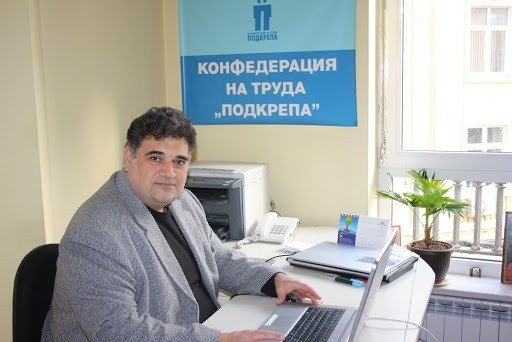
On the World Day for Safety and Health at Work, April 28, the International Trade Union Confederation (ITUC) has called for classifying Covid-19 as an occupational disease.
The aim is to provide better protection in the workplace, as well as to guarantee the possibility of receiving compensation and medical assistance.
"Although many aspects of the SARS-CoV-2 virus have not yet been fully elucidated, facts indicate that most infections have occurred in the workplace," said Ms. Sharan Burrow, secretary general of the ITUC. “Therefore, the inclusion of Covid-19 in the classification of occupational diseases is crucial in limiting the spread of the virus. This is even more urgent now that countries are beginning to ease restrictions on economic sectors and public spaces."
The fight to overcome the global pandemic and prevention are a major concern for Bulgarian trade unions which are ready for constructive dialogue and interaction.
 "Employers have the leading responsibility for everything that happens, and when it comes to safety and health at work, they have a responsibility for each worker and for the whole team," the secretary of Bulgaria’s Podkrepa Confederation of Labour, Alexander Zagorov, told Radio Bulgaria. “The other thing we need to know is that collective safeguards should be prioritized because they can be used to easier protect large groups of people. And when there are no collective measures, individual protection measures must be respected. So far, the biological risks and hazards of contagion have not been so much in the focus of occupational safety and health. They have been the subject of public health. The health system has taken care of sick workers, we have managed to cope as a society, so we think that we will be able to cope also now. However, the practice of recent days shows otherwise. With both outbreaks of infection - at the factory in Pleven and at the Bobov Dol thermal power plant, it turned out that we were far from prepared. At first glance, employers have taken enough measures, but nevertheless the infection has started to penetrate the teams."
"Employers have the leading responsibility for everything that happens, and when it comes to safety and health at work, they have a responsibility for each worker and for the whole team," the secretary of Bulgaria’s Podkrepa Confederation of Labour, Alexander Zagorov, told Radio Bulgaria. “The other thing we need to know is that collective safeguards should be prioritized because they can be used to easier protect large groups of people. And when there are no collective measures, individual protection measures must be respected. So far, the biological risks and hazards of contagion have not been so much in the focus of occupational safety and health. They have been the subject of public health. The health system has taken care of sick workers, we have managed to cope as a society, so we think that we will be able to cope also now. However, the practice of recent days shows otherwise. With both outbreaks of infection - at the factory in Pleven and at the Bobov Dol thermal power plant, it turned out that we were far from prepared. At first glance, employers have taken enough measures, but nevertheless the infection has started to penetrate the teams."
Therefore, the classification of Covid-19 as an occupational disease will enhance the public health measures that will be developed over the coming months and years. In this regard, trade unions have called for workplace safety to be granted fundamental rights status by the International Labour Organization. This measure would guarantee the protection of workers against fatal incidents and occupational diseases, along with freedom of association, collective bargaining, protection against discrimination, forced labour and child labour.
English Rossitsa Petcova
Modernizing critical thinking skills, fact-checking skills and media literacy are essential for society, especially for young people in Bulgaria - the country with one of the lowest media literacy indices in the EU, reports the educational platform..
The residents of Pleven (Central North Bulgaria) will bid farewell to 2024 with a Christmas Town and meetings with Santa Claus. This year's festive program of the local municipality will start on December 2 with the Christmas tree lighting ceremony at..
An innovation for the treatment of diabetic foot ulcer using the patient's own tissue and artificial intelligence has been implemented at the University Multi-profile Hospital for Active Treatment-Burgas. Bulgaria is the fourth European country to start..
Modernizing critical thinking skills, fact-checking skills and media literacy are essential for society, especially for young people in Bulgaria - the..
"You say you are Bulgarian, but you do not know Bulgarian" – this reproach from officials in Bulgaria has been faced by quite a few by our compatriots..
The survival of millions of people around the world, living in conditions of war, hunger, disease and immense despair, is at stake every day. We often..

+359 2 9336 661
